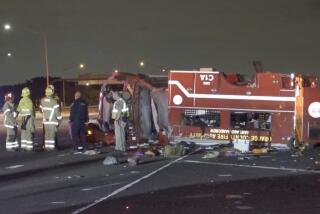Court to decide search rights in stopped cars
Are the passengers in a car that has been stopped by the police “seized” by the authorities, or are they free to walk away?
The Supreme Court took up that question Monday in a California case that could decide whether passengers are protected from “unreasonable searches and seizures” when officers pull over the vehicle in which they are riding.
Last year, the California Supreme Court gave police more leeway to search occupants of cars they stop when it ruled that drug evidence found on a passenger could be used against him.
The passenger was “not seized as a constitutional matter” when the driver was pulled over, the state court said in a 4-3 decision. Under that reasoning, the passenger had given tacit consent to be searched by staying in the car.
Most of the justices on the U.S. high court said Monday that view did not square with common sense. Several said they would not feel free to walk away if a police officer stopped the car they were riding in. The tenor of their comments suggested the California ruling would be reversed.
“Policemen don’t like people jumping out of the car,” said Justice Antonin Scalia. “If I were ... a passenger ... I would certainly not feel free to immediately open the door and start walking away.”
Asked Justice David H. Souter: “Don’t you think that a reasonable passenger ... would assume the officer is in control and that, in the absence of some affirmative indication that the passenger can go, that he’s supposed to sit there?”
A lawyer for California defending the state court’s ruling insisted passengers in stopped cars are free to leave. He also described the interaction between police and passengers as “consensual encounters.”
When a police car flashes its red light, the officer is ordering the driver to pull over, said Clifford Zall, a deputy state attorney general. “When the driver submits to that show of authority, the driver is seized. The passenger is not seized.”
The distinction could prove especially crucial when a traffic stop is found to be illegal but police find incriminating evidence on a passenger. Usually, an illegal search and seizure prompts a judge to throw out all evidence that had been gathered. But under the California ruling, the evidence found on the passenger could be used because he was not seized.
“I think that’s a quite surprising proposition,” Justice Anthony M. Kennedy told Zall.
Zall said that state officials “have talked to the California Highway Patrol, who make over a million stops a year in California, and they treat passengers as free to leave.”
Zall agreed it might not be “prudent” to walk away from a stopped car, but that “doesn’t make [the stop] a seizure” of passengers.
The case before the court began in 2001 when a deputy in Yuba City pulled over a car because he thought it might have an expired registration sticker. He was wrong, but the officer recognized a front-seat passenger, Bruce Brendlin, and arrested him as a parole violator.
He also found items used for making methamphetamine; Brendlin was later convicted of a drug crime.
On appeal, Brendlin contended he had been stopped and searched in violation of the 4th Amendment, and he won before a state appeals court. But the state Supreme Court restored his conviction in June 2006 with its ruling he had not been seized when the deputy stopped the car.
The justices will issue a ruling in Brendlin vs. California by late June.
*
More to Read
Sign up for Essential California
The most important California stories and recommendations in your inbox every morning.
You may occasionally receive promotional content from the Los Angeles Times.











